- Home
- Richard Powers
Bewilderment Page 4
Bewilderment Read online
Page 4
THAT NIGHT WE WENT TO FALASHA, a planet so dark we were lucky to find it. It wandered in empty space, an orphan without a sun. It had its own star once, but got ejected during its home system’s troubled youth. “When I was in school, no one even mentioned them,” I told him. “Now we think rogue planets might even outnumber stars.”
We watched Falasha drift through interstellar emptiness, in timeless night and temperatures a few degrees above absolute zero.
Why did we come here, Dad? It’s the deadest place in the universe.
“That’s what science thought, too, when I was your age.”
Every belief will be outgrown, in time. The first lesson of the universe is to never reason from only a single instance. Unless you only have one instance. In which case: find another.
I pointed out the thick greenhouse atmosphere and the hot, radiating core. I showed him how the tidal friction from a large moon bent and pinched the planet, further warming it. We touched down on Falasha’s surface. Nice! my excited son said.
“Above the melting point of water.”
In the middle of empty space! But no sun. No plants. No photosynthesis. No nothing.
“Life can eat all kinds of things,” I reminded him. “And only one of those is light.”
We went to the bottom of Falasha’s oceans, into their volcanic seams. We aimed our headlamps into the deepest trenches, and he gasped. Creatures everywhere: white crabs and clams, purple tube worms and living draperies. Everything fed on the heat and chemistry oozing from hydrothermal vents.
He couldn’t get enough. He watched as microbes and worms and crustaceans learned new tricks, fed on themselves, and spread their nutrients across seafloors into the surrounding waters. Whole periods went by, eras, even eons. The oceans of Falasha filled with forms, all kinds of outrageous designs, swimming and evading and outmaneuvering.
“We should call it a day,” I said.
But he wanted to keep watching. The vents spewed and cooled. The currents of the waters shifted. Small upheavals and local catastrophes favored the cagey. Sessile barnacles turned into free swimmers, and swimmers developed the power to predict. Pilgrim adventurers colonized new places.
My son was hypnotized. What will happen in a billion more years?
“We’ll have to come back and see.”
We rose from the pitch-black planet. It shrank beneath us, and in no time it was invisible again.
How on Earth did we ever discover this place?
And that’s where the story turned surreal. A lineage of slow, weak, naked, awkward creatures on a far luckier planet had lasted through several near-extinctions and held on long enough to discover that gravity bent light, everywhere in the universe. For no good reason and at insane expense, we’d built an instrument able to see the tiniest bend in starlight made by this small body, from scores of light-years away.
Get out, my son said. You’re making that up.
And we were, we Earthlings. Making it up as we went along, then proving it for all the universe to see.
WE HIT THE ROAD BY DAWN. Robbie was at his best as the sun came up. He got that from his mother, who could solve dozens of not-for-profit crises before breakfast. That morning, he was willing to treat even banishment as an adventure.
The country had been so volatile when we left, and days of spotty reception left me anxious about what was waiting for us back out here. I waited until we got out of Tennessee to tune in the news. Two headlines in, I regretted it. Hurricane Trent’s hundred-mile-an-hour winds returned a good stretch of the South Fork of Long Island to the sea. U.S. and Chinese fleets were playing nuclear cat-and-mouse off Hainan Island. An eighteen-deck cruise ship named Beauty of the Seas exploded off St. John’s, Antigua, killing scores of passengers and wounding hundreds more. Several groups claimed responsibility. In Philadelphia, stoked by social media flame wars, True America militias attacked a HUE demonstration and three people were dead.
I tried to change the station, but Robbie wouldn’t let me. We have to know, Dad. It’s good citizenship.
Maybe it was. Maybe it was even good parenting. Or maybe it was a colossal error in judgment, to let him go on listening.
Following the fires that had taken out three thousand homes across the San Fernando Valley, the President was blaming the trees. His executive order called for two hundred thousand acres of national forest to be cut down. The acres weren’t even all in California.
Holy crap, my son shouted. I didn’t bother with a language check. Can he do that?
The news announcer answered for me. In the name of national security, the President could do pretty much anything.
The President is a dung beetle.
“Don’t say that, bud.”
He is.
“Robin, listen to me. You can’t talk like that.”
Why not?
“Because they can put you in jail, now. Remember when we talked about it, last month?”
He fell back in his seat, having second thoughts about good citizenship.
Well, he is. A you-know-what. He’s wrecking everything.
“I know. But we can’t say so out loud. Besides. You’re being totally unfair.”
He looked at me, baffled. Two beats later, he broke into a spectacular grin. You’re right! Dung beetles are pretty amazing.
“Did you know that they navigate by mental maps of the Milky Way?”
He looked at me, mouth agape. The fact seemed too weird to be invented. He pulled out his pocket notebook and made a note to fact-check me when we got home.
UP THROUGH THE DIMINISHING HILLS of Kentucky, past the Creation Museum and Ark Encounter, through counties that had little use for science of any kind, we listened to Flowers for Algernon. I’d read it at age eleven. It was one of the first books in my two-thousand-volume library of science fiction. I bought it in a used bookstore—a mass market paperback bearing a creepy image of a face halfway between mouse and man. Paying for it with my own money felt like cracking the code of adulthood. Holding it open in my hands, I wormholed into a different Earth. Small, light, portable parallel universes turned out to be the only thing in this life I’d ever collect.
Algernon didn’t quite start me down the path of science. That was the “sea monkeys,” a kind of brine shrimp shipped to me in an astonishing state of cryptobiosis. By Robbie’s age, I’d already tabulated my first data sets on their hatching rates. But Algernon lit up my proto-scientific imagination and made me want to experiment on something the size of my own life. I hadn’t read the story in decades, and a twelve-hour drive seemed the perfect excuse to revisit with Robin in tow.
The story gripped him. He kept making me pause for questions. He’s changing, Dad. You hear his words getting bigger? A little later, he asked: Is this for real? I mean: Could it ever be for real, someday?
I told him everything could be for real, somewhere, someday. That may have been a mistake.
By the time we reached southern Indiana’s long stretch of factory farms, he was swept up, limiting his commentary to cheers and jeers. We went for miles at a shot, Robin leaning forward, a hand on the dash, forgetting even to look out the window. He was spawning synapses as fast as Charlie Gordon, whose IQ rose to precarious heights. Robbie winced through Charlie’s rejection at the hands of his coworkers. The moral ambiguity of the experimenting scientists Nemur and Strauss hurt him so much I had to remind him to breathe.
When Algernon died, he made me stop the recording. Really? He couldn’t wrap his head around the fact. The mouse is dead? His face flirted with quitting the story altogether. But Algernon had already ended much of the innocence Robin still possessed. The mind’s eye had two bafflements: coming out of the light and going into it.
“You know what that means? You see what’s coming?” But Robin couldn’t see the consequences for Charlie. Nor did he much care. I resumed the story. A minute later, he made me pause again.
But the mouse, Dad. The muh-hu-hu-mouse! His voice mock-mourned, like a smaller, youn
ger kid. But not far down, the play was real.
We stopped for the night at a motel near Champaign-Urbana, Illinois. He wouldn’t sleep until the story ended. He lay on his bed, suffering through Charlie’s final decline with sphinxlike stoicism. At the end, he nodded, and motioned for lights-out. I asked him what he thought, but he simply shrugged. Only in the dark did it come out of him.
Did Mom ever read this story?
The question blindsided me. “I don’t know. I think so. Probably. It’s kind of a classic. Why do you ask?”
Why do you think? he said, sharper than perhaps intended. When he spoke again, he was contrite. He was going into the light, or coming out of it. I couldn’t tell which. You know. The mouse, Dad. The mouse.
WE GOT TO MADISON A LITTLE AFTER NOON on the day I’d promised to get Robin back to school. I got the automated text saying he was absent without excuse and asking if I knew that (Please reply Y or N). I should have brought him straight to class. But there were only a few hours left of school, and I was feeling how I always felt whenever I had to hand him over to people who didn’t get him. I wanted him to myself a little longer.
I brought him to campus with me. I dreaded going in after so long away. We got my mail, and I checked in with my grad assistant, Jinjing, who’d taught my undergrad classes in my absence. Jinjing fussed over Robin like he was her own little brother back in Shenzhen. She took him to see the display case of meteorites and the photos from Cassini. I took the opportunity to get chewed out by Carl Stryker, my colleague and coauthor on a paper about detecting biosignature gases from lensing-revealed exoplanets that I was holding up.
“MIT is going to scoop us,” Stryker said. Of course it was. MIT or Princeton or the EANA was always scooping us. It wasn’t enough for anyone simply to do science. Everything was a race for priority, for professional advancement, for a share of the shrinking grants pool and a raffle ticket to Stockholm. The truth was, Stryker and I were never going to win the Swedish Sweepstakes. But continued funding was nice. And I was jeopardizing that by failing to refine my model data for the article.
“Is it the boy, again?” Stryker asked.
I wanted to say: He has a name, jerk-face. But yes, I said, it was the boy, silently begging my collaborator to cut me a little slack. Stryker didn’t have much slack to give. Fifteen years ago, the exoplanet bonanza had turned the grants agencies as generous toward astrobiology as the Renaissance courts had been to any adventurer with a caravel. But Earth was shakier now, and the funding winds had changed.
“We need the edits by Monday, Theo. I’m serious.”
I told him I could manage by Monday. I left Stryker’s office wondering what my career in this infant field might have been like, had I never married. A little luckier, maybe. But nothing in existence could ever be luckier than Alyssa and Robin.
MY LIFE WENT THROUGH ITS OWN LITTLE HADEAN EON, back in my Muncie childhood. Hell everywhere. The details are blissfully fuzzy now. I grew up fast. By rough count, my mother harbored six different personalities inside herself, and half of them were capable of doing me and my two older sisters real harm. By the time my father commenced his slow suicide by painkillers, I’d already traded in boy soprano for the more demanding hobby of sitting in my room and panicking.
When I was thirteen, Dad made us kids scrub up and sit behind him in court as he was sentenced for embezzling. The ploy must have worked because he got only eight months. But we lost the house, and my father never again earned more than minimum wage. I wouldn’t have made it through those years without brains in a vat, Dyson spheres, arcologies, spooky action at a distance, Afrofuturism, Retro-pulp, and psi machines. From Alpha-beams to the Omega Point, I lived in a parallel place that spawned scenarios of such infinite variety that they made a laughingstock of the little parochial rock in the galactic sticks where I lived. Nothing could hurt me so long as consensual reality was just a tiny atoll in an ocean without shores.
By twelfth grade, I was fast-track apprenticing for my own career as a drunk. My two best friends and netherworld partners called me Mad Dog. Remarkably, I made it through to graduation without going to jail. But absent the scholarship from the electronic-organ company where a couple of my mother’s personalities worked as a secretary, I would never have gone to college. As it was, I went only because it beat the summer job I had, cleaning out septic tanks for a company whose slogan was, “A Straight Flush Beats a Full House.”
I headed downstate, to the flagship public school. There I took a biology survey picked at random out of the course catalog to meet a general education requirement. It was taught by a bacteriologist name Katja McMillian. She was cylindrical and stork-like, a super-annuated Big Ethel Muggs. But Mondays, Wednesdays, and Fridays, she stood in a bowl of four hundred undergraduates, on fire. Week after week she worked to show us how none of us had a clue what life could do.
There were creatures that retooled themselves into something unrecognizable halfway through their life. There were creatures that saw infrared and sensed magnetic fields. There were creatures that changed sex based upon straw polls of the neighborhood, and single cells that acted en masse by sensing quorums. Lecture by lecture, it dawned on me: Astounding Stories had nothing on Dr. McMillian.
In week twelve, almost through the semester, she arrived at the creatures she loved. A revolution was under way, and Dr. McMillian was on the barricades. Researchers were finding life where science knew it could not live. Life was eking out a living above the boiling point and below freezing. It staked out places Dr. McMillian’s own professors once insisted were too salty, too acidic, and too radioactive for any creature to survive. Life made a home high up on the edge of space. Life lived deep in solid rock.
I sat in the back of the auditorium thinking: My people. At last.
Dr. McMillian hired me to assist on a summer field expedition to study alien life-forms in a sinkhole under Lake Huron that someone had discovered by accident. They were among the most bizarrely creative creatures on this planet—switching like Jekyll and Hyde from anoxic to oxygenic photosynthesis when the tasty sulfur ran out. The crazy biochemistry behind Dr. McMillian’s bipolar extremophiles suggested how life took hold and shaped a hostile planet into something more conducive for life. Working for her was a waking dream, for a guy who loved to stay out in any weather.
Professor McMillian’s inflated letter of recommendation—largely accurate, she told me, if still mostly predictive—got me a graduate assistantship at U Dub. Seattle was the best place I could have landed, given my skill set, which consisted of holding still and looking at things, the stranger the better. The microbiology program was strong, and the extremophile people adopted me as close enough for kin.
I joined a multidisciplinary team modeling how oxygenated meltwater between glaciers and the seas kept organisms alive when Earth was frozen up like a giant snowball. According to our models, that sliver of life, over agonizingly long stretches of time, helped turn the snowball planet back into a runaway garden.
While I studied, crazy things were happening far away. Data flowed back from instruments flying all over the Solar System. The planets were wilder than anyone suspected. Moons of Jupiter and Saturn turned out to be hiding liquid oceans beneath their suspiciously smooth crusts. All the Earthly chauvinisms began to fall. We’d been reasoning from a sample of one. Life might not need surface water. It might not need water at all. It might not even need a surface.
I was living through one of the great revolutions in human thought. A few years before, most astronomers thought they’d never live to see the discovery of even a single planet outside the solar system. By the time I was halfway through graduate school, the eight or nine planets known to exist turned into dozens, then hundreds. At first they were mostly gas giants. Then Kepler was launched, and Earth was flooded with worlds, some not much larger than ours.
The universe changed from one semester to the next. People were looking at infinitesimal changes in the light of immensely distant stars�
��reductions in brightness of a few parts per million—and calculating the invisible bodies that dimmed them in transiting. Minuscule wobbles in the motion of massive suns—changes of less than one meter per second in the velocity of a star—were betraying the size and mass of invisible planets tugging on them. The precision of these measurements defied belief. It was like trying to use a ruler to measure a distance a hundred times smaller than the amount the ruler would expand from the heat of your hand.
We did that. We Earthlings.
New habitats everywhere: no one could keep up. People were finding hot Jupiters and mini-Neptunes, diamond planets and nickel planets, gas dwarfs and ice giants. Super Earths in the habitable zones of K- and M-class stars seemed as suited for a spark of life as this place ever was. The whole idea of the Goldilocks zone got blown wide open. The life we’d found in Earth’s harshest regions could easily thrive in many of the regions now springing up throughout space.
I woke one morning looking down on my body where I lay in bed. I saw myself the way my old mentor Dr. McMillian sized up a new species of archaea. I weighed where I’d come from, my cast of mind, the sum of my failings and capabilities, and I knew what I wanted to do before my small part of this giant experiment ended. I’d visit Enceladus and Europa and Proxima Centauri b, at least via spectroscopy. I’d learn how to read the histories and biographies of their atmospheres. And I’d comb through those distant oceans of air for the slightest signs of anything breathing.
ONE DAY NEAR THE END OF MY PH.D., back from a week of field sampling, I sat down in a campus computer lab next to a frantic but friendly woman who, by chance, was struggling with one of the few quirks in the university file system I knew how to solve. She leaned over to ask for help, a thing, it turned out, she never did. And the first words out of her earnest mouth—Do you know how ttt-t . . . ?—tripped on a stutter that caught even her by surprise.

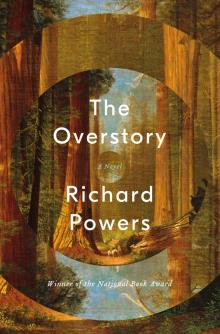 The Overstory
The Overstory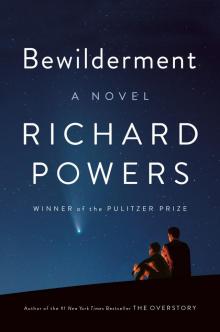 Bewilderment
Bewilderment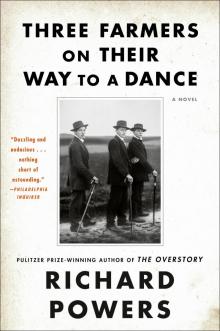 Three Farmers on Their Way to a Dance
Three Farmers on Their Way to a Dance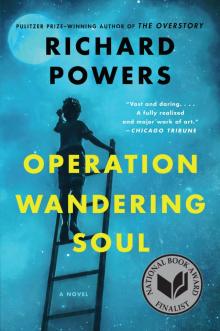 Operation Wandering Soul
Operation Wandering Soul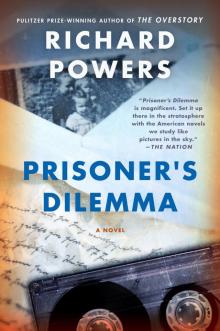 Prisoner's Dilemma
Prisoner's Dilemma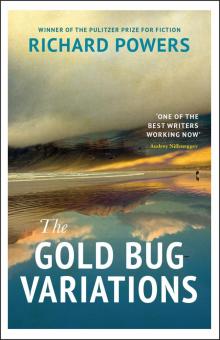 The Gold Bug Variations
The Gold Bug Variations Generosity: An Enhancement
Generosity: An Enhancement The Echo Maker
The Echo Maker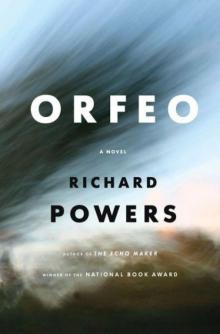 Orfeo
Orfeo The Time of Our Singing
The Time of Our Singing PLOWING THE DARK
PLOWING THE DARK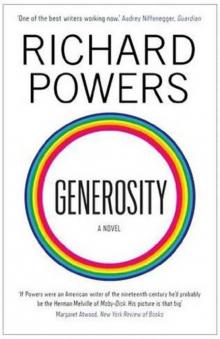 Generosity
Generosity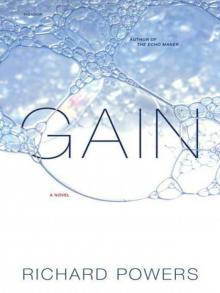 Gain
Gain